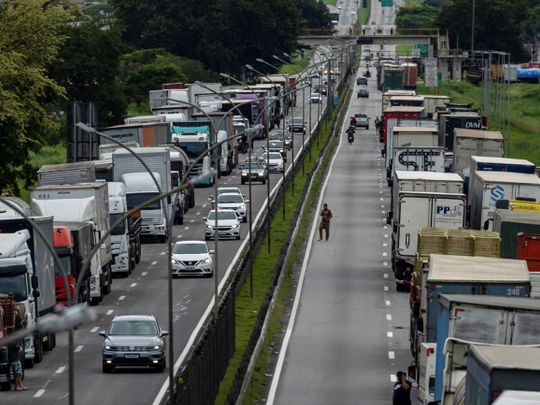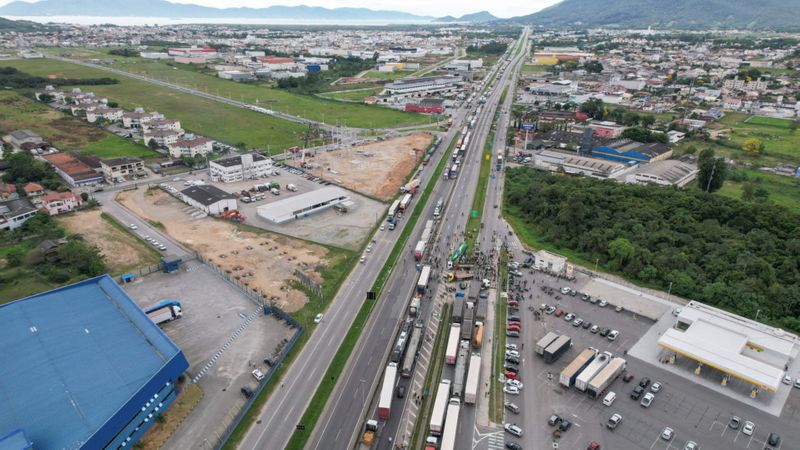
Protests by backers of Jair Bolsonaro, led by truck drivers, have spread across the country as the Brazilian president remains silent over his loss in Sunday’s election, so far refusing to concede defeat to his foe Luiz Inacio Lula da Silva.
Supporters of the firebrand president, unhappy with the election result, blocked roads across 23 states and the capital and restricted access to Sao Paulo international airport late Monday evening, forcing the cancellation of some flights. Over 300 federal highways were partially or fully blocked at one point, according to the police.
Supreme Court Justice Alexandre de Moraes, who also oversaw the electoral court for the election process, ordered the federal highway police to clear the protests, warning of fines reaching 100,000 reais ($19,306) per hour per vehicle and that the agency’s director could be sidelined if he didn’t comply.
As of Tuesday morning, some 289 protests continued to block the free circulation of traffic, down from a maximum of 342, O Estado de S. Paulo reported. While Sao Paulo’s Guarulhos airport showed flights were departing normally from its multiple terminals, a message posted to its Twitter account said that access was still partially obstructed due to protests.
Bolsonaro has refused to make any public comments after the electoral court said he lost Brazil’s runoff to Lula on Sunday by less than 2 percentage points, the narrowest margin for a presidential election in the country’s modern history. Newspaper Valor Economico reported that the president may acknowledge the result of the election in a written message on Tuesday as angst grows in Brasilia about the president’s next steps.
Truck drivers are one of the main bases of Bolsonaro’s support and yield significant political power in a country as geographically vast as Brazil. While grassroots groups don’t accept the president’s electoral loss, their protest was disavowed by the federation of truckers, which gather the main transportation companies in the South American nation.
Back in 2018, a trucker strike that lasted for about 10 days demanding lower diesel prices and other concessions caused major economic harm to the country.

The president on Monday met with his Chief of Staff Ciro Nogueira and some other ministers and advisers as well as his oldest son, Senator Flavio Bolsonaro. In a tweet on Monday afternoon, Flavio Bolsonaro thanked his father’s supporters and said they wouldn’t give up on Brazil, without specifically referring to the outcome.
While the president’s decision to not immediately recognize the result isn’t a complete surprise given his long history of attacks against Brazil’s electoral system, it’s hardly a sign that the institutional framework of the country is about to be derailed.
The heads of the country’s senate and lower house quickly accepted the election results on Sunday night along with the supreme court justices and some of Bolsonaro’s closest allies. US President Joe Biden also congratulated Lula in a phone call on Monday.
“He’s going to keep working normally through the end of his mandate,” said Tarcisio de Freitas, a former infrastructure minister under Bolsonaro who was elected governor of Sao Paulo state.
Yet the president’s silence can hurt the transition process. By law, Brazil’s government needs to organise a formal handover process right after the vote, with the president-elect allowed to nominate 50 people to meet officials and exchange government information. The outgoing administration typically coordinates with the team of the next president during the following two months so there is a smooth transition when the new government takes over Jan. 1.
If Bolsonaro decides not to accept the results, it would halt “the traditional government transition process that starts right after the election,” Rio de Janeiro-based political analyst Thomas Traumann wrote in a note Monday. “Bolsonaro will use the next two months to handicap Lula’s administration from the beginning.”
Meanwhile, Brazilian assets have largely shrugged off initial concerns, with stocks of companies expected to benefit from Lula’s presidency rallying on Monday after the election while the real reversed earlier losses to post the biggest gain among the world’s major currencies.
While a strategy to try to discredit the election “is unlikely to yield a favourable result for Bolsonaro, that can be a tactic to keep his base mobilized to oppose a Lula administration,” Eurasia Group analysts wrote in a report.












